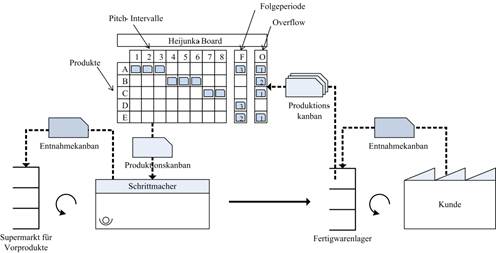The term "Lean Manufacturing" was coined by Womack, Jones and Ross in 1992 and is currently experiencing a renaissance. Having begun in the 90s with the introduction of methods based on the Toyota Production System (TPS) model, this approach was temporarily behind other. Especially partial aspects, whose effects are easily detectable, such as the decentralized control by Kanban, were adapted. The wider concept of lean thinking, which is primarily due to successful projects was indeed respected, but not understood and therefore often dropped again. Central decision support systems for supply chain management occurred for operational management and became more important. However, the efforts often fail due the insufficient data base and especially due the fluctuations in ambient conditions.
By analysing the cause-effect relationships and the building of mathematical models the functioning of lean manufacturing is to be shown. The effects of market demand on production management and supplier integration show that an effective system must respond robustly to changing structures.
The design of the supply chain and the decentralized control by appropriate control loops are just as much in focus of the observations as the efficient implementation of the principles in production and assembly.
The levelling is one of the core elements of lean production systems. Here, a smoothed production pattern is set on the pacemaker process, which helps smooth out and soothe the production.
Furthermore, an upper limit for the release of production orders for the upstream stages is obtained.
Thus, the levelling helps to reduce the transfer of load peaks in river upstream processes and thus enables a constant utilization of production processes.

Research: The IFL models are developed for mapping levelled production systems and derive recommendations for the design and configuration of these systems.
Industrial consulting: The IFL supports companies through training, seminars and joint projects in understanding, interpretation and implementation of levelled production systems. In this case, the training is usually composed of an introduction to the theory of production systems, which includes basic understanding of lead time and variability, as well as the calculation of the kanban number, determination of the EPEI (Every Part Every Interval) and the levelling pattern. Subsequently, a production system is simulated and gradually expanded to scenarios such as rejections, availability fluctuations, large orders and make-to-order products. This simulation provides the opportunity to test what you have learned and to visualize easily the understanding of action effects. We also use this simulation to visualize design projects for the introduction of such systems. Here, the simulation game will be individually adapted to the local situation and the steps from design to operation worked out together, so that the employees have the opportunity to review their own plans using the simulation and obtain confidence in the functioning of the system. The basis for this is usually real data from the ERP system.
What we do: Support for the implementation planning for the restructuring of the installation and material supply, interpretation of the market/ pull-systems, value stream design, staff training, supplier management.

